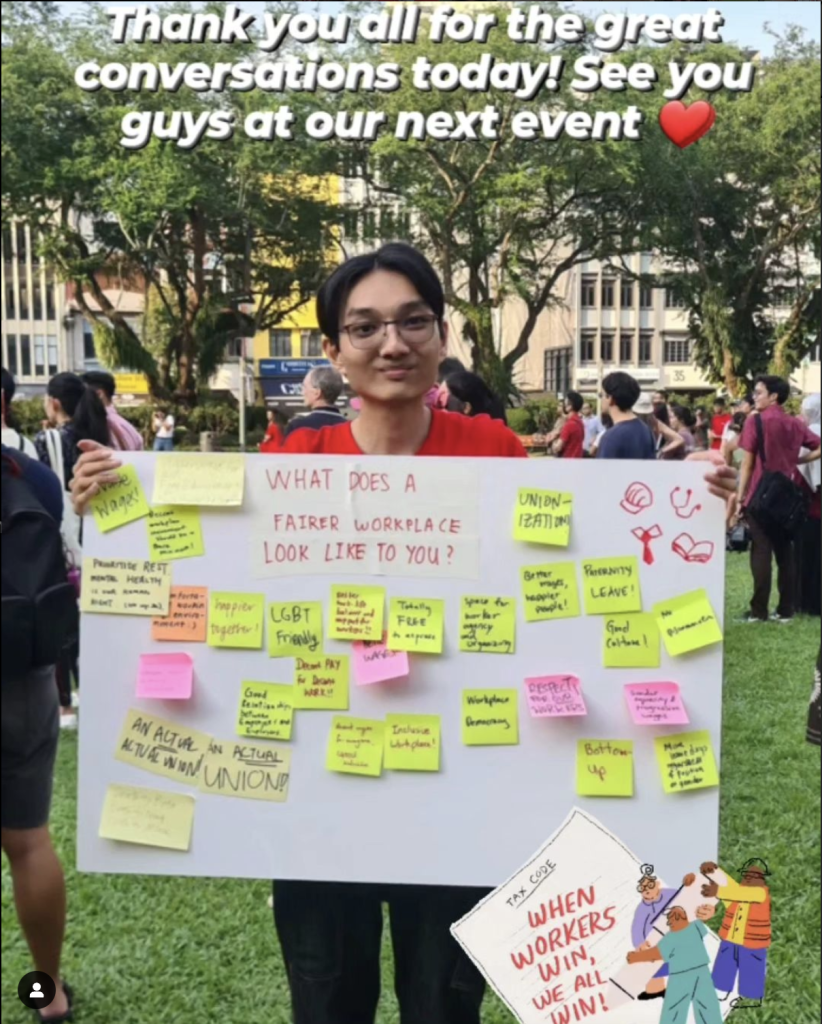Over 1,400 people joined Singapore’s climate rally on September 23 at Hong Lim Park, the only place in the city where citizens can hold a protest without requiring a police permit.
This was Singapore’s first climate rally since 2019. Organizers said the rally was for “climate-concerned everyday Singaporeans who want to stand for a greener and fairer Singapore for everyone.” They added that this year’s theme intended to promote inclusivity:
We gather today because we believe that Singapore must take stronger and swifter action to reduce greenhouse gas emissions and offer robust support to communities most vulnerable to the impacts of climate change.
Kristian-Marc James Paul, one of the organizers, told the sustainability media publication Eco-Business about their aim of reminding authorities about the disproportionately harsh impact of climate change on low-income families and communities:
We are equally worried about cost of living. Which is why we try to promote the message of climate justice, because if we are thinking about mitigating climate change, we have to do it in an inclusive way.
Another demand is for Singapore to acknowledge how it contributes to the degradation of the natural resources of its neighbors in Southeast Asia:
Singapore has benefitted for decades from cheap migrant labour while extracting natural resources from our surrounding neighbours through acts of deforestation and sand mining. And lastly, Singapore’s wealth was built partly through becoming a hub for petrochemicals as well as a maritime and aviation hub — all of which are fossil fuel-intensive industries.
To deliver the message of the rally, participants were asked to wear red to signify the climate emergency and to write a postcard to members of parliament.
At the end of the four-hour program, 309 postcards were collected by the organizers. Several opposition MPs attended the rally. One of them was Gerald Giam of the Workers’ Party who wrote on Facebook his praise for the initiative:
It’s excellent that this ground up initiative is not just about climate change per se, but is also concerned about other groups like workers and indigenous groups who are affected by climate change and the transition to a greener economy.
Some participants who posted commentaries, photos, and videos of the rally on social media described the protest as “anti-corporate, youth-driven messaging, holding authorities to account for greenwashing.” A major theme expressed support for the welfare of workers and migrants:

https://www.instagram.com/p/Cxk3LoKxBLN/?utm_source=ig_web_copy_link&igshid=MzRlODBiNWFlZA==
On Facebook, Hoonie Swee Hoon Lim wrote about what she observed at the rally:
Glad to see more #ecowarriors, young voices, new groups n initiatives. It’s a collective effort of different groups with different causes, but what is key is collaboration. We are all part of an ecosystem and cannot operate alone. This is what I see as a main problem as egos and alignment don’t match. Glad that there are more awareness n more concerned about #GoingGreen.
Wake Up Singapore news platform acknowledged the legacy of the previous generation of environmentalists:
Even as more people join the movement, one must not forget our predecessors who forged the path to make this possible–daring to take on the government and push back against their development plans, organising petitions and events to draw greater awareness to environmental issues, and developing robust policy recommendations to signal to the government that citizens should have a greater say in policymaking.
News reports noted that this year’s rally gathered fewer people compared to the 2,000 participants of the 2019 rally. Organizers and participants hope that the enthusiasm generated by the recent rally will create greater awareness about climate issues. Organizers also emphasized the importance of organizing collective actions:
We believe that collective action is just as important — protests and rallies all around the world like this one have helped to push governments to enact stronger climate policies.
Mong Palatino is an activist and former two-term member of the Philippine House of Representatives. Blogging since 2004 at mongster’s nest, he joined Global Voices in 2006.
This article was first published by Global Voices.